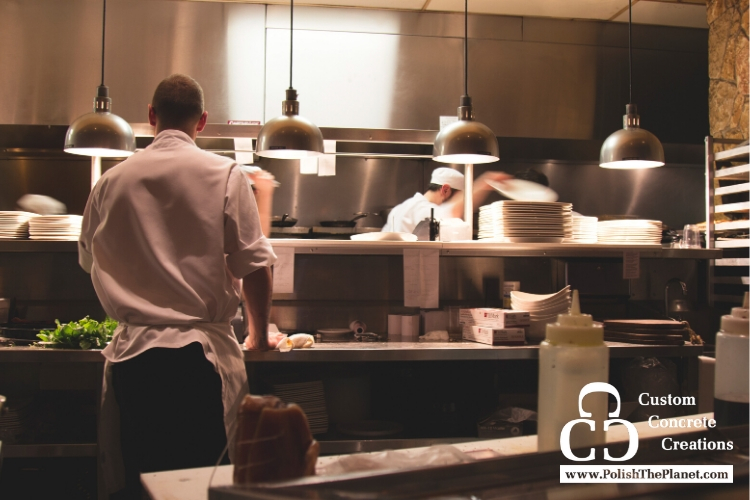
Spills are a common occurrence in most kitchens, especially commercial kitchens where food and drinks are passing through at high volume and high speed. Since a commercial kitchen must be kept running smoothly to continue to be efficient and successful, cleaning up spills needs to be quick and painless.
Beyond cleanup, commercial kitchens have certain requirements to ensure safety, proper care and the prevention of bacteria and pests. Aside from the state requirements, most food service staff have boxes they need checked as well to make their jobs a little bit easier during rushes and at the end of the night. What are the specific needs of commercial kitchen floors and how can a polished concrete kitchen make for the perfect addition?
Hygienic:
With food and drink spillage and a high volume of traffic, flooring needs to be sanitary and as easy to clean as possible. Flooring like tile with grout and crevices can increase the chances of microbial proliferation by trapping substances in those seams. Once germs or mold begins to grow, it can be virtually impossible to completely eliminate them.
A polished concrete kitchen has a completely seamless surface, eradicating the worry of bacteria growing in those small spaces. Due to the easy cleanup, hygiene is easy to maintain by quickly cleaning up spills and keeping a regular mopping schedule. Cleaning of polished concrete is simple, which means you don’t have to spend valuable time on messes.
Durable:
Commercial kitchens constantly run the risk of having heavy tools and equipment dropped, which can damage certain flooring quite easily. Stovetops, fryers and ovens can spill damaging liquids like hot grease and oil or boiling water on floors, which damages their protective coating. It can also seep through the top layer and that increases the risk for bacterial growth which lessens the life of the flooring. Whole grain flour, sugar, salt, spices and other granular substances can be abrasive, especially when combined with harsh solvents and degreasers used during cleaning.
One of the reasons commercial businesses opt for a polished concrete kitchen is because of it’s durable properties. It is resistant to high foot traffic, heavy machinery and varying temperatures. It is very difficult to scratch or chip polished concrete flooring, making it ideal for hygiene requirements and easy cleanup. Polished concrete can save you money due to the durability by requiring less repairs caused by damages.
Moisture tolerant:
Besides the obvious moisture threat created by spilling, the activities in a commercial kitchen create humidity and moisture in the room. Cooking, cleanup, dishwashing and constant foot traffic can create condensation on the walls, ceilings and flooring. This requires the floor to be tolerant of these various forms of moisture.
Polished concrete is a non-porous material, meaning that it will not absorb moisture. This is crucial in extending the life of your flooring and preventing the spread of bacteria. It also allows for water to move along the surface, ensuring a proper drainage system.
Meeting the criteria for commercial kitchen flooring needs is important for the safety of the employees as well as the convenience of their work experience. Creating a space that has a limited chance of bacterial growth, can survive heat or cold and impact from heavy tools will ensure a successful, high functioning kitchen, which translates to the success of the business in general.
A polished concrete kitchen in a commercial environment is one way to feel confident about your kitchen’s safety and hygienic practices. It will stand the test of time and allow you to focus on what really matters - the food!
